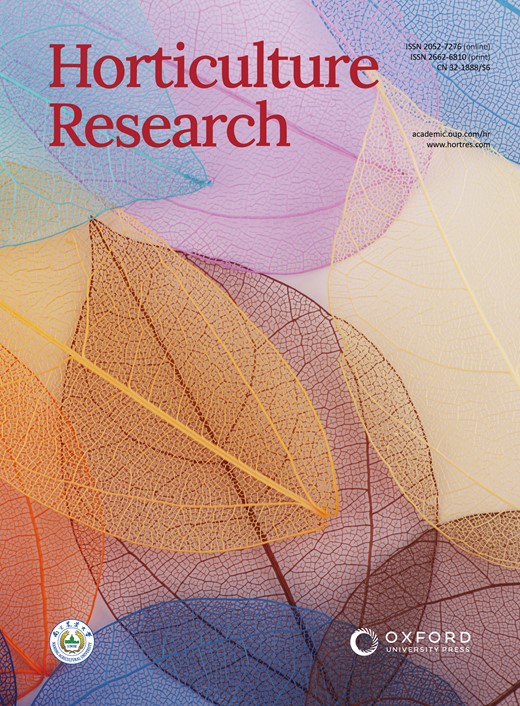chang papeda (Citrus changensis) WRKY27-SPDS1模块通过调节亚精胺含量促进其耐寒性
IF 8.7
1区 农林科学
Q1 Agricultural and Biological Sciences
引用次数: 0
摘要
精胺(Spd)是高等植物中最主要的多胺之一,在对抗各种非生物胁迫中发挥着至关重要的作用。然而,人们对植物精胺合成酶(SPDS)基因在耐寒中的分子功能和潜在调控机制仍然知之甚少。在本研究中,冷处理显著诱导了柑橘属耐寒植物伊昌八宝景天(Citrus ichangensis)中 Spd 的积累并增强了 SPDS 的活性。外源 Spd 的供给显著提高了耐寒性。在伊昌柏中发现了两个 SPDS 基因(CiSPDS1 和 CiSPDS2),但只有 CiSPDS1 在寒冷条件下大幅上调。在烟草(Nicotiana tabacum)和对寒冷敏感的柑橘类植物柠檬(C. limon)中过量表达 CiSPDS1 可促进 Spd 的合成,增强转基因植物的耐寒性。相反,通过病毒诱导基因沉默(VIGS)敲除伊昌八角枫中的 CiSPDS1 则抑制了 Spd 的合成,大大降低了耐寒性,而通过外源补充 Spd 则可恢复耐寒性。此外,我们还证明了伊昌柏的 WRKY27(CiWRKY27)通过与 W-box 顺式作用元件相互作用,直接结合并激活了 CiSPDS1 启动子。同时,VIGS 介导的 CiWRKY27 沉默导致 CiSPDS1 转录水平和 Spd 含量显著降低,并显著削弱了伊昌柏的耐寒性。综上所述,本研究说明了 CiSPDS1 在耐寒中的作用,并确定其为 CiWRKY27 的直接靶标。这些发现深入揭示了 CiWRKY27-CiSPDS1 分子模块调控 Spd 积累以调节耐寒性的调控机制。本文章由计算机程序翻译,如有差异,请以英文原文为准。
WRKY27-SPDS1 module of Ichang papeda (Citrus ichangensis) promotes cold tolerance by modulating spermidine content
Spermidine (Spd) is one of the predominant polyamines in higher plants and plays a crucial role in combating various abiotic stresses. However, the molecular functions and underlying regulatory mechanisms associated with plant spermidine synthase (SPDS) genes in cold tolerance remain poorly understood. In this study, cold treatment markedly induced Spd accumulation and enhanced SPDS activity in Ichang papeda (Citrus ichangensis), a cold-hardy plant in Citrus genus. Exogenous Spd supply led to dramatically improved cold tolerance. Two SPDS genes (CiSPDS1 and CiSPDS2) were identified in Ichang papeda, but only CiSPDS1 was substantially up-regulated by cold. Overexpressing of CiSPDS1 in both tobacco (Nicotiana tabacum) and lemon (C. limon), a cold-sensitive Citrus species, promoted Spd synthesis and enhanced cold tolerance in the transgenic plants. In contrast, knockdown of CiSPDS1 in Ichang papeda by virus-induced gene silencing (VIGS) repressed Spd synthesis and greatly impaired the cold tolerance, which was restored by exogenous replenishment of Spd. In addition, we demonstrated that WRKY27 of Ichang papeda (CiWRKY27) directly bound to and activated the CiSPDS1 promoter through interacting with a W-box cis-acting element. Meanwhile, VIGS-mediated silencing of CiWRKY27 resulted in marked reduction of CiSPDS1 transcript levels and Spd contents and significantly impaired the cold tolerance in Ichang papeda. Taken together, this study illustrated the role of CiSPDS1 in cold tolerance and identified it as a direct target of CiWRKY27. These findings provide insight into the regulatory mechanism by which the molecular module CiWRKY27-CiSPDS1 regulates Spd accumulation for modulation of cold tolerance.
求助全文
通过发布文献求助,成功后即可免费获取论文全文。
去求助
来源期刊

Horticulture Research
Biochemistry, Genetics and Molecular Biology-Biochemistry
CiteScore
11.20
自引率
6.90%
发文量
367
审稿时长
20 weeks
期刊介绍:
Horticulture Research, an open access journal affiliated with Nanjing Agricultural University, has achieved the prestigious ranking of number one in the Horticulture category of the Journal Citation Reports ™ from Clarivate, 2022. As a leading publication in the field, the journal is dedicated to disseminating original research articles, comprehensive reviews, insightful perspectives, thought-provoking comments, and valuable correspondence articles and letters to the editor. Its scope encompasses all vital aspects of horticultural plants and disciplines, such as biotechnology, breeding, cellular and molecular biology, evolution, genetics, inter-species interactions, physiology, and the origination and domestication of crops.
 求助内容:
求助内容: 应助结果提醒方式:
应助结果提醒方式:


